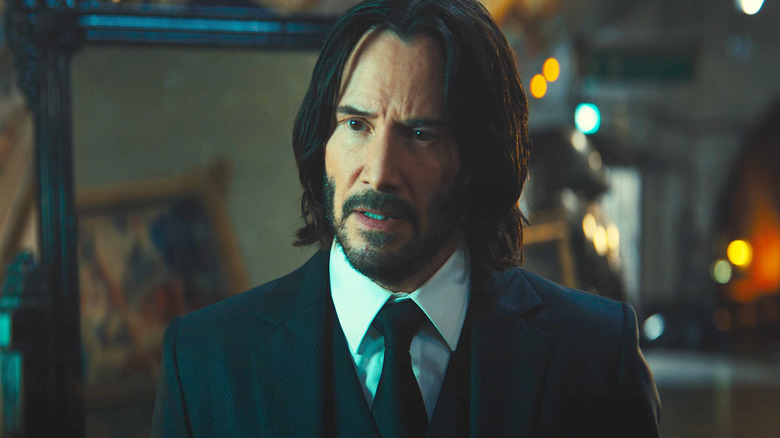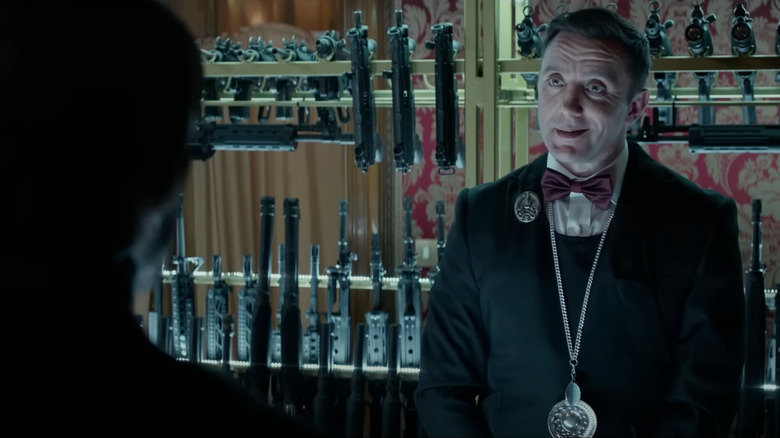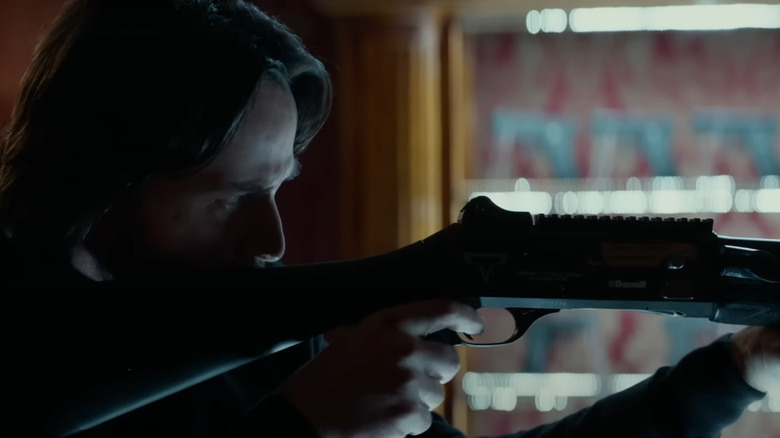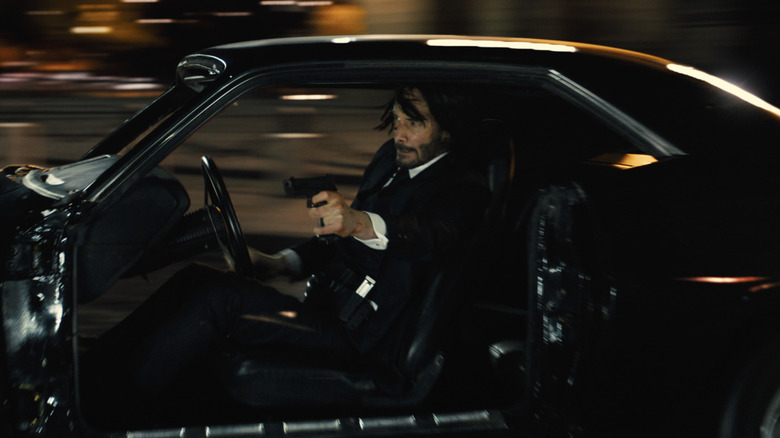How John Wick Keeps A Safe Set In A Franchise Riddled With Weapons
Besides punching people in impressively stylish ways, John Wick is known for being really good with guns. When he isn't using pencils to dispatch his enemies, or crushing thugs' necks with library books, Keanu Reeves' hitman is taking out hordes of foes with some of the most elite firearms skills ever seen on screen. It's part of the whole John Wick gun-fu style, which builds on John Woo's pioneering method for filming shootouts by basically turning everything up to 11. At this point, the John Wick movies are essentially excuses to show off some of the most advanced combat choreography you're likely to see, and a big part of that has been Wick's gun-slinging abilities.
Of course, it helps that Reeves has an unparalleled dedication to learning these combat skills himself. Since the John Wick franchise started back in 2014, many a video of the actor deftly working his way through shooting courses during training has gone viral. And in "John Wick: Chapter 2," series director Chad Stahelski dedicated a whole scene specifically to guns, wherein Peter Serafinowicz becomes the Q to Reeves' Bond as he presents the titular hitman with a range of possible firearm options, describing each one in detail.
In other words, the John Wick movies are overloaded with guns. But with so many prop firearms on set, there's an increased chance that someone could get hurt. And Stahelski knows first-hand the importance of keeping things as safe as possible.
Chad Stahelski takes gun safety seriously
Firearm safety on-set has become a major talking point in the wake of the "Rust" tragedy, in which cinematographer Halyna Hutchins died after a prop gun misfired. And while such incidents are rare, the Hutchins example was not, unfortunately, the first time someone has been fatally wounded by a prop gun during filming. Perhaps the most infamous example would be Brandon Lee, who in 1993 was killed while filming "The Crow" after being shot with a .44-caliber slug that should have been a blank.
And there are plenty more examples of on-set accidents. Back in 2016, the Associated Press reported that 43 people died on sets in the U.S. since 1990, and that at least 150 more suffered "life-altering injuries." The report doesn't break down how many of those were firearms-related, but it does note that despite these alarming numbers, "set accidents remain largely hidden and the consequences usually amount to mere thousands of dollars in fines paid out of multimillion-dollar budgets."
But, for Chad Stahelski, the issue of firearm safety couldn't be more important. The former stunt performer was brought in to double for Brandon Lee in "The Crow" following the actor's untimely death and had been friends with Lee for five years prior to the incident. When Yahoo sat down with Stahelski in 2019, he spoke about how a lot of the safety precautions on the John Wick movies "came about because of [Lee's] accident," and how "there's no one thing that you could point a finger at, it was a lot of little dumb mistakes that shouldn't have happened." It seems those mistakes ensured Stahelski never forgot the importance of on-set safety, especially when it came to the gun-heavy John Wick movies.
'No reason to have a practically functioning gun on a set'
Since the very first "John Wick" in 2014, Chad Stahelski has ensured his film sets are as safe as possible — although Keanu Reeves did slice open a stuntman's head at one point. But in terms of guns, things couldn't be more secure. Four years after his Yahoo interview, the filmmaker spoke to Indiewire about "John Wick: Chapter 4," and was no less serious about his stringent safety protocols:
"There is no reason to have a practically functioning gun on a set. To have a live round on a set is criminal. There isn't a gun on our set that you could put a round into that it would be able to fire."
The report also notes that Stahelski's stunt crews train for six months before filming — much more than the standard four to eight weeks. Meanwhile, Reeves will train for six to eight months prior to shooting, all of which contributes to Stahelski's safe set.
And for his part, weapons master Rock Galotti, who worked with John Woo on his 1997 foray into Hollywood with "Face/Off," runs a tight ship. He told Indiewire he expects "everyone to listen" on-set and talked through how prop guns are inspected by the first assistant director, the stunt coordinator, and himself before being handed to actors. The weapons master also revealed that stuntmen make use of rubber prop and Airsoft guns that shoot plastic pellets, as well as Galotti's own "solid plug load" or "solid plug" guns which don't even have a hole for anything to be shot out of.
And as if that wasn't enough, Stahelski and his team can rely on digital effects to enhance safety by leaving the muzzle flashes, slide movement, and brass ejections up to computer graphics.
John Wick has a perfect gun safety record
Chad Stahelski's sets sound about as secure as a production can be, then. But what about when John Wick picks up a new weapon with which to savage his enemies — say, a shotgun that shoots literal fire? Remember that top-down sequence at the end of "John Wick: Chapter 4" where John Wick takes out a house full of enemies with his fiery rounds? Well, it turns out the gun and its explosiveness is based on real ammunition called "Dragon's Breath." But this being a John Wick movie, there was no way the crew was going to use a gun that shot actual fire, even if it was controlled.
In this case, digital effects came into play once again. According to the Indiewire report, the VFX team would film real Dragon's Breath, then superimpose it over the footage to get the effect they needed. That, and there were a couple of "propane pellets" that actually did hit stuntmen on set, who would then activate squibs on their body that set off real flames. Otherwise, things were about as controlled as they could be.
The result of all this was summed up by stunt coordinator Scott Roger, who told Indiewire, "Four 'John Wicks' and hundreds of thousands of rounds that have been shot, and no one has ever gotten hurt by them." Which is why, despite the series being obsessed with firearms, it's ok to hate guns and love John Wick movies.



